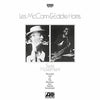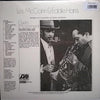



Les McCann & Eddie Harris - Swiss Movement
Les McCann (piano, vocal), Eddie Harris (tenor saxophone, Benny Bailey (trumpet), Leroy Vinnegar (bass), Donald Dean (drums)
Written by Les McCann (A3, B1, B2), Gene McDaniels (A1), Eddie Harris (A2)
1 LP, standard sleeve
Original analog Master tape : YES
Heavy Press : 180g
Record color : black
Speed : 33 RPM
Size : 12'’
Stereo
Live
Record Press : Pallas
Label : Speakers Corner
Original Label : Atlantic
Recording: June 1969 live at Montreux Jazz Festival
Production: Joel Dorn & Nesuhi Ertegun
Originally released in 1969
Reissued in 2018
Tracks :
Side A :
- Compared To What
- Cold Duck Time
- Kathleen’s Theme
Side B :
- You Got It In Your Soulness
- The Generation Gap
Reviews :
« One of the most popular soul jazz albums of all time, and one of the best, although Harris (and trumpeter Benny Bailey) had never played or rehearsed with the Les McCann Trio before, and indeed wasn't even given the music. Perhaps that's what sparked the spontaneous funk coming through clearly on the tape of this show, recorded at the Montreux Festival in 1969. It's actually much more of a showcase for McCann than Harris, although the tenor saxist's contributions are significant. The sole vocal, a version of Gene McDaniels' "Compared to What," remains McCann's signature tune. » AllMusic Review by Richie Unterberger
« Speakers Corner releases a masterful vinyl upgrade of an historic jazz concert !
1969 is regarded as one of the most eventful years in American culture. To be specific. the tumultuous extremes of the Sixties were exemplified by the cultural landmarks. There was a moon landing, Woodstock, the draft lottery, Charles Manson, the introduction of the Pontiac Trans Am, the Boeing 747 and the establishment of PBS. The advent of anti-establishment protest spread throughout the country. Movies like Easy Rider defined the restlessness and dysfunction of the counterculture. The musical landscape in 1969 reflected the rebellious ideology as well. Hyperbolic political and social contexts were intermingled with the expanding musical genre-bending.
Jazz was undergoing a transformation also. Veteran cool jazz icon Miles Davis was experimenting with electric rock/funk. Many artists embraced a soul ambiance in the new jazz structures. These soul jazz performers included Jimmy Smith, Stanley Turrentine, Hank Crawford, Curtis Fuller, Freddie Hubbard and Herbie Hancock. Two jazz players, pianist Les McCann and tenor saxophonist Eddie Harris became catalysts in this movement. At the 1969 Montreux Jazz Festival, McCann’s trio and Eddie Harris’ quartet were on the bill separately. In an impromptu decision, Harris agreed to sit in with the McCann trio and was joined by expatriated trumpeter Benny Bailey. The recorded live performance, Swiss Movement accomplished several things. It became a hit record and the track, “Compared To What” became a hit crossover single. Additionally, this performance elevated the Montreux Jazz Festival to international acclaim.
Speakers Corner has re-mastered Swiss Movement to audiophile vinyl and nearly fifty years later, it’s impact is still evident. The five-song set (recorded on the final night of the festival) captures the improvisational and cohesive qualities of this ensemble. The opening cut, Gene McDaniel’s “Compared To What” kicks things off with a furious jam. With a pulsating left hand, McCann establishes a funky rhythm template. In the piano intro, he quickly visits “Age Of Aquarius (from the Broadway show Hair), before transitioning to the funkier soul chops. McCann’s smoky vocals are compelling. The up tempo, joyous soul jam is juxtaposed with gritty, angry lyrics. He ruminates on Vietnam, Nixon, religion, abortion in a desperate plea. McCann weaves cascading modulated chords with “backbeat” notation. Eddie Harris pushes the rhythmic and tonal boundaries of his tenor. Bailey joins in with a pair of blistering solos as the 8:18 “soul rhapsody” returns to verse. The crowd reacts with enthusiasm, and jazz history is made. There have been other covers (all good) by Ray Charles, Roberta Flack and Brian Auger, but this one is potent with elegance and timeless riffs
McCann introduces a brand new tune, “Cold Duck Time” (written by Harris), that contains some of the accessible sprightliness of “Compared To What”, but provides subtle tempo shifts. Harris’ mellifluous saxophone is evident on both solos. Bailey’s crisp, low-vibrato runs are stellar and McCann hits a funky groove in his extended solo. On a McCann original (“Kathleen’s Theme”), the quintet slows things down in what feels like a more classic translation. There is some delicate cymbal touches by Donald Dean, and a nimble descending bass line by Leroy Vinnegar. Harris manages to stretch out on his sax runs and combines with McCann on a harmonious dual melody lead.
Side Two continues the celebratory ambiance of the set. Another McCann original “You Got It In Your Soulness” begins with McCann laying down some prominent gospel hooks. His opening is inspired, full of bluesy vamps, boogie-woogie left hand and jubilant vocal exhortation. Harris follows with a sultry, lyrical turn, before turning it over to Bailey. The trumpeter evokes both piercing accents and dialed back nuances. McCann folds in with the rhythm section before the closing run that employs a percolating sustain, almost like an organ. The finale, “The Generation Gap” has cinematic resonance with an ethereal piano lead. Harris adds deep “breathy” sax phrasing, while Bailey emulates traditional jazz aesthetic. McCann offers a last solo that draws on hot licks and mellow suppleness. The set closes on a bluesy fade.
The audio re-mastering by Speakers Corner is excellent. The overall mix has good stereo separation. The various expanded tones of the sax and trumpet are captured with vibrancy. Harris piano is clean and blends with the band seamlessly. The analog mix showcases the live intimacy of the group. The crowd noise is still prominent and mirrors the excitement on stage. The album cover and back contain the original black & white photographs and the iconic red and green Atlantic label is eye-catching and nostalgic.
This is a great album and should be part of any jazz aficionado’s vinyl collection ! » Robbie Gerson, Audiophile Audition, Apr 8, 2018
Les McCann had already been playing his way through the clubs and record studios on the US west coast for ten years when his appearance on 21 June 1969 at the relatively new and jazz-soaked festival in Montreux on Lake Geneva changed all that. There, he celebrated his greatest musical success, his number one hit. Half ironically, but proudly in later concerts, when the piano stool could hardly bear him due to his size and weight, he stressed that "Swiss Movement" had supported him, his wife, children and grandchildren.
"Compared To What" is a catchy melody that is heard on the radio, again and again, all around the world, today, tomorrow and the day after … It is unmistakable, still groovy, full of soul, humorous, stirring. And "Cold Duck Time" is no way inferior: Eddie Harris blows for all he is worth. Everyone can hear that Benny Bailey was challenged by the unknown themes, but this maestro still managed to capture the audience’s ear and attention.
"Swiss Movement" is, and will remain forever, a highlight among all the jazz LPs that have been recorded live and it shouldn’t be missing from any collector’s shelf. Along with Benny Goodman’s Carnegie Hall Concert from 1938, Charlie Parker & Co.’s Massey Hall concert from 1953, and Ella Fitzgerald’s Berlin concert from 1960 – and very few others.
Ratings :
AllMusic : 5 / 5 , Discogs : Rate Your Music :


